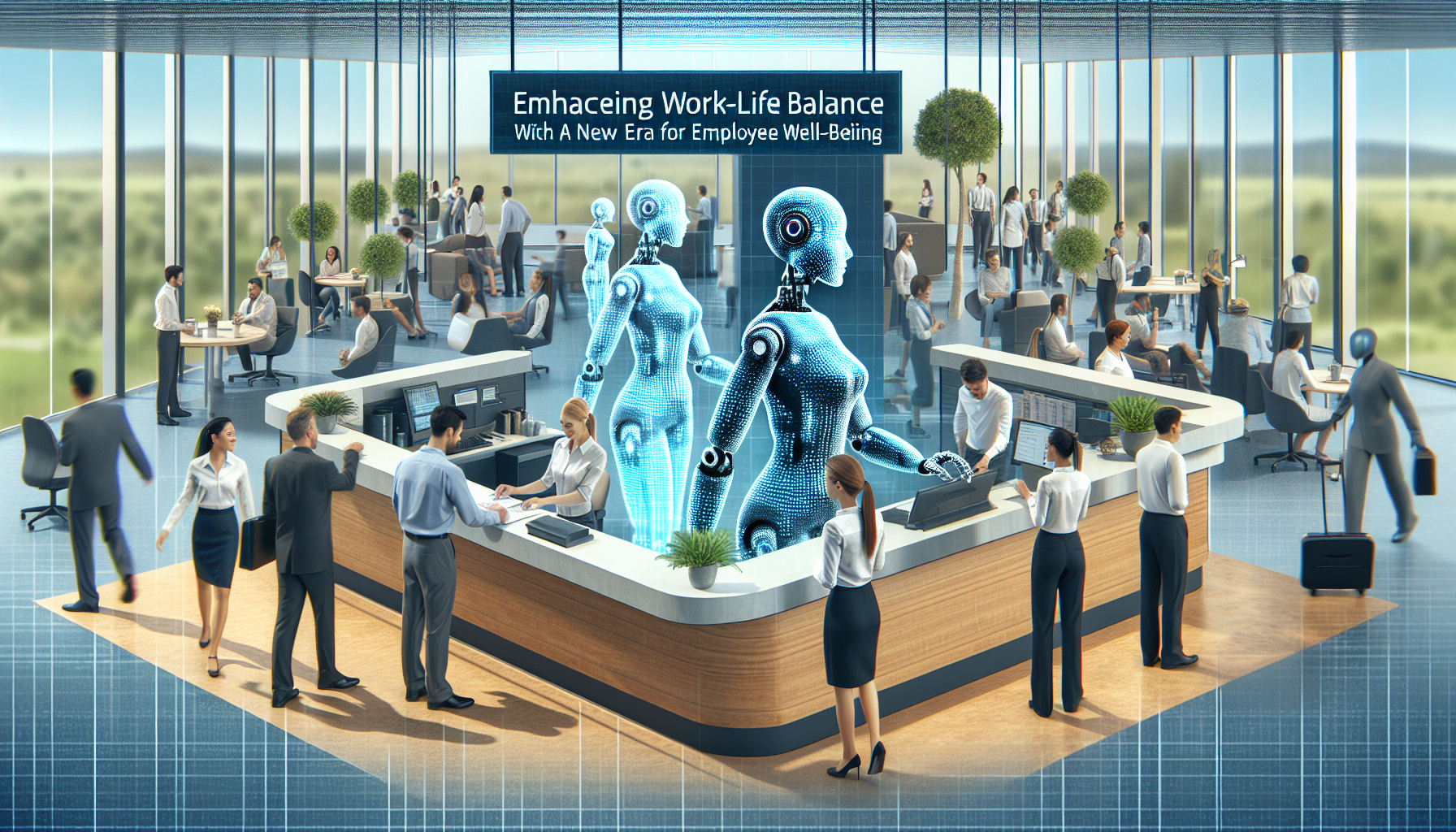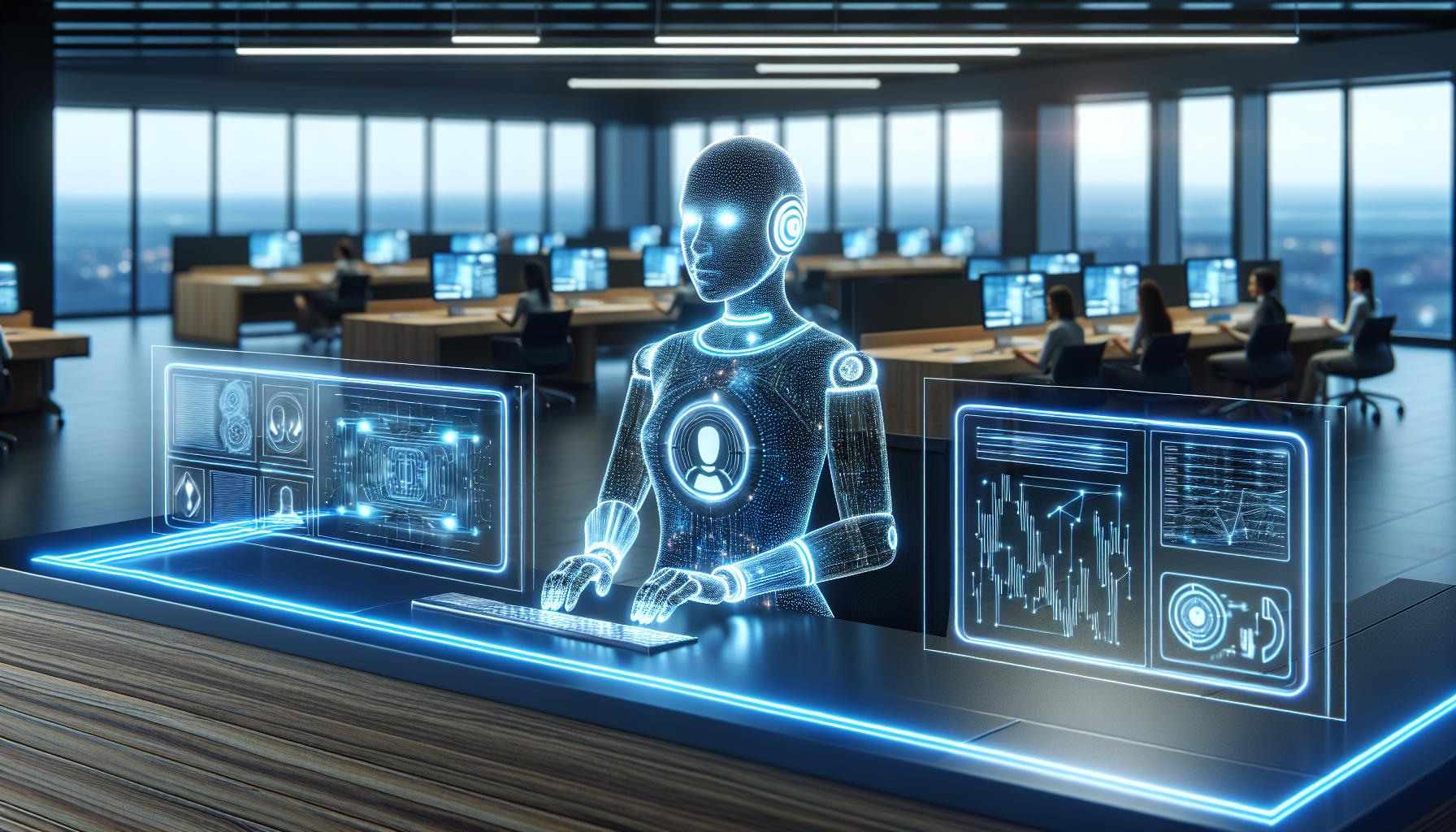
Drifting slowly into the mainstream, Artificial Intelligence (AI) technology has been making significant strides in various sectors, including within our workplaces. One application making waves due to its incredible resources, efficiency, and newfound contributions to employee work-life balance is the AI receptionist.
The AI receptionist, or virtual receptionist, essentially acts as the digitized frontline of an organization. It utilizes AI-driven technology to undertake administrative duties such as attending to phone calls, scheduling appointments, managing visitor check-ins, and addressing queries. What makes this technology unique and increasingly desirable are its 24/7 availability, the ability to speak multiple languages, multitasking capabilities, and now, its potential in improving work-life balance for employees.

Saying that a company is leveraging an 'AI Receptionist' to manage office front desk needs no longer raises eyebrows but rather sparks interests. This technology is fast becoming an integral part in modern workplaces as it steps in to effectively manage repetitive tasks, freeing employees for more stimulating work and alleviating work pressure. Hence, they directly contribute to employee’s work-life balance, a factor that is fast becoming a key aspect in gauging job satisfaction. More notably, these AI receptionists minimize human intervention and contact, a precious commodity in the time of a global pandemic.
In upcoming sections, we will delve deeper into the emerging role of AI receptionists in workplaces, their functionalities, and the future possibilities. While AI adoption may appear intimidating, understanding its applications and potential benefits often alleviates hesitations. And so we explore this technology that combines innovation with user-friendliness, and the unanticipated yet appreciated role it plays in achieving a balanced work-life for employees.
In the fast-paced working environments of today, maintaining work-life balance is becoming increasingly challenging. One innovative solution that is gaining momentum is the implementation of AI receptionists. By seamlessly handling routine administrative tasks, these AI-powered systems are making significant contributions towards improving employee work-life balance.
AI receptionists, also known as virtual assistants, typically manage statewide phone calls, schedule appointments, and can also handle customer service inquiries. IBM's Watson Assistant, for instance, is capable of handling a large volume of inquiries and can understand, learn from, and respond to human speech. This easy offloading of routine tasks to an AI receptionist can reduce the administrative burden on human employees, thereby allowing them to focus more on core business tasks.
Another significant way AI receptionists are improving work-life balance is through their 24/7 availability. Unlike human receptionists who usually work in designated office hours, AI receptionists can provide round-the-clock service without any fatigue or the need for breaks. Zendesk's AI chatbot is a classic example of this, offering support to clients and customers at any time of the day. This means more flexibility for human staff, giving them freedom to manage their work schedule more effectively and achieve a healthier work-life balance.
Furthermore, by using machine learning algorithms, these AI systems can adapt and learn from previous interactions, improving their ability in understanding customer requirements. This constant growth in efficiency and effectiveness can significantly reduce the need for human intervention and supervision, again contributing towards reducing the workloads of human employees.
In conclusion, AI receptionists represent a powerful tool that can greatly lessen the administrative strain on employees. With decreased work pressures and increased time for personal growth and leisure, employees can achieve a better work-life balance, enhancing both their productivity and satisfaction at work.
In the modern corporate landscape, the quest for work-life balance has never been more critical. Employees are increasingly in search of roles that respect their personal time, a factor that has provided a fitting stage for the emergence of AI receptionists. These intelligent systems handle calls and inquiries around-the-clock, reducing disruptions to employee personal time and the need for costly overtime work.

One significant advantage of AI receptionists is the ability to provide 24/7 service without requiring overtime. A standout example is Mycroft, a state-of-the-art AI system designed to field inquiries intelligently. Mycroft can handle the inflow of inquiries both during and after business hours, ensuring that no call or customer goes unanswered. Employees can effectively sign out from work at the end of the workday, confident that the AI system will competently handle customer interaction in their absence.
By deploying systems such as these, businesses effectively avoid the commonplace disruption of after-hours calls, reducing adverse impacts on employees' personal time. Having an AI handle after-hours customer interaction also curbs unnecessary spending on overtime, which drives operational efficiency.
Moreover, in instances where employees might be compelled to work beyond regular hours to catch up on backlog tasks, the utilization of Clara, an AI-based scheduling assistant, becomes invaluable. Clara coordinates and arranges meetings, effectively managing employees' calendars and ensuring a healthy balance between work and personal commitments.
In conclusion, the integration of AI receptionists harbinger a major shift in the operational model of businesses. The use of technology in delegating critical receptionist tasks reduces the need for after-hours work, thereby improving employee work-life balance. It depicts a future where the lines between work and personal time are clearly demarcated, reducing burnout and enhancing overall staff productivity.
One of the key advantages of employing AI Receptionists is their capacity to enhance employee work-life balance, and in turn, employee satisfaction. A significant factor that contributes to job dissatisfaction is burnout, often caused by repetitive and menial tasks that leave little room for creative or critical thinking. By transferring such tasks onto AI, companies can liberate their personnel, fostering an environment that encourages ingenuity and job satisfaction.
Reduction of Burnout is one of the cardinal benefits of an AI-driven work environment. According to a Gallup study, consistent burnout can lead to a 63% higher chance of taking a sick day and a 2.6 times higher likelihood of actively seeking a new job. AI Receptionists deal with mundane tasks like scheduling meetings, handling customer queries, and managing databases, cutting down employee workload significantly. As a result, employees find themselves with improved work-life balance and reduced burnout.
Upon embracing AI in reception roles, businesses also notice a stark rise in their Employee Morale. Free of routine, repetitive tasks, employees can focus on more essential, fulfilling responsibilities. This leads not only to increased productivity but also infuses a sense of purpose in their roles. A study by the PWC Consulting has predicted that in 2021, organizations will prioritize the human-work machine collaboration, leading to happier and more engaged employees.
Embracing the power of AI Receptionists can, therefore, pave the way for a more balanced, satisfying work environment. By streamlining routine tasks, these AI maestros can significantly reduce burnout and elevate employee morale, indispensably contributing to the overall job satisfaction. This exciting union of technology and humanity opens up new horizons, pushing the frontier of what is achievable in the modern workplace.
As technology advances, so does the capability to balance optimal employee productivity with personal happiness – a concept widely known as work-life balance. Companies are now exploring ways to automate their internal systems and improve efficacy by utilizing artificial intelligence (AI). One solution that has effectively emerged is the use of AI Receptionists. Anchored on the proposition that happy employees translate to successful businesses, AI receptionists aim to reduce workloads and stress, enabling staff to focus more on their roles, and importantly, their lives outside the office.
Implementing AI receptionists smoothly requires a well-thought-out integration plan, which ensures both efficiency gains and minimal disruption to existing processes. Initial steps should involve understanding your company's unique requirements, then tailoring the functionality of your AI receptionist to meet these needs.
The beauty of modern AI solutions lies in their capacity for customization. Thus, companies can choose to utilize an AI operation platform that blends seamlessly with current workflows, or potentially restructure workflows around the abilities of the AI.
No matter the chosen approach, it is important to educate and encourage your team to embrace and utilize this change. Creating an internal adoption strategy that facilitates understanding, buy-in, and ultimately usage, is a key factor in a successful transition.
Moreover, human receptionists can now focus their time on more complex tasks that cannot be fulfilled by an AI, thus encouraging personal development and reducing the monotony of routine tasks.
By fully harnessing the power of AI receptionists, companies can provide their employees with a healthier balance between work and personal life, enabling them to feel less stressed, more motivated, and better equipped to handle workloads comfortably. While there's no one-size-fits-all strategy in AI receptionist integration, careful planning, employee engagement, and proper adoption practices prove to be the keys to enhancing work-life balance and business success.
The role of AI receptionists is steadily evolving, driven by continuous advancements in AI technology. The future will see them taking on even more responsibilities, beyond handling mundane tasks. As productivity tools, they hold remarkable promise in improving work-life balance for employees.
One anticipated trend is the AI receptionist’s transition into a full-fledged digital assistant. It’s expected that these AI receptionists will be able to manage more complex tasks like setting agendas, booking business travel, even handling simple HR functions. For example, the AI receptionist of tomorrow may be equipped to sort out leaves, benefits, and payroll inquiries. Services like x.ai and Clara are already moving in this direction, offering AI-driven personal assistants that can manage calendars, schedule meetings, and much more.
Furthermore, with improving Natural Language Processing (NLP) capabilities, future AI receptionists are anticipated to understand and respond to queries in a more human-like manner. This implies that they will be capable of comprehending a wider range of vocal instructions and even detect and adapt to the emotional state of the employee, using sophisticated sentiment analysis algorithms. Such enhancements, backed by technologies like DeepMind and OpenAI, will empower employees to interact more smoothly with their AI colleagues, thereby reducing stress and distractions at work.
Beyond these, AI receptionists are also expected to evolve into learning entities, acquiring information and knowledge over time. This transformation may realize the prospect of AI that can tailor its responses and services to each individual employee – a powerful tool for improving work-life balance. Imagine an AI receptionist that learns your preferences over time: knowing you prefer morning meetings, suggesting breaks when you are most productive, even reminding you to have lunch on busy days. The technology that drives IBM's Watson Assistant is a potential harbinger of what’s to come.
While these trends hold thrilled anticipation, they also call for a critical examination. As AI receptionists become more ingrained in office routines, questions surrounding privacy, job displacement, and over-reliance on technology will become even more important. Nonetheless, the potential of AI receptionists in facilitating a healthier work-life balance for employees is truly exciting!
Start your free trial for My AI Front Desk today, it takes minutes to setup!








